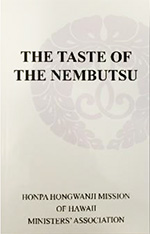
A message from Rev. Shinkai Murakami which appears in the book, “The Taste of the Nembutsu,” published in 2016 by the HHMH State Ministers’ Association. The book is a collection of dharma messages by each of the active ministers.
To extend the reach of the dharma within these messages, we will publish one per week on our website.
Habit (Kuse)
Rev. Shinkai Murakami
Namo Amida Butsu
I don’t know when I started saying the words “Dokkoisho” or “Yokkoisho” when I got up off the floor or couch. When I was young (I still feel that I am young!), I never used those words. In fact, I used to tease my grandmother and my teachers when I was in elementary school because they always said those words whenever they got up off the floor. Now, it is my turn to use these words, and my Japanese school students copy me and laugh as they stand up from the floor. My Japanese School students asked me “Sensei, why do you say that? Why do you use those words?”
…life is impermanent and everything is changing…
I don’t know why I use these words instead of others. Why am I not saying some others words such as “Let’s go!” or “Thank you!” or “Get up!” It must be that I am getting older.
Buddhism teaches us the reality of our lives as we are getting older – day-by-day because life is impermanent and everything is changing.
Ever since I reached the age of 40, it seems to me that I am visiting the doctor’s office more often with many kinds of medical problems. My vision is getting weak that I need eyeglasses. My teeth are getting more cavities, so I have them filled. I have problems with my throat, stomach, and other ailments. When I overwork or participate in sports, I can guarantee that my body will be sore the next day, and it will not heal for a few days. Is this only happening to me?
…Birth, old age, sickness, and death…
Buddha Shakyamuni stated that we have four great sufferings in our lives. These are birth, old age, sickness, and death. Life is very short and fragile.
…We have tomorrow, but tomorrow might never come…
We must remember what Rennyo Shonin said in his great message, “We must listen to the Dharma now. We always feel that we have tomorrow, but tomorrow might never come for us.” Each moment we are getting older and our life is getting shorter. We must now listen to the Nembutsu teachings as our spiritual guide, so that our hearts become much richer and stronger spiritually and be able to accept things as it is.
…I believe the Nembutsu, Namo Amida Butsu, will be flowing from our mouth…
Whenever we try to stand up from the floor or couch and say “Dokkoisho” or “Yokkoisho,” it frequently comes out from our mouth without thinking about it. However, if we really received (listen to) Amida’s great teachings, may be the Nembutsu, Namo Amida Butsu, will be flowing from our mouth instead of “Dokkoisho” or “Yokkoisho.”
…We have so much “Iranmono” (rubbish or unnecessary thinking) in our mind…
In our daily lives, instead of saying “Thank you,” we are grumbling to others. Instead of thinking of others, we think of ourselves first which “I” comes first. These selfish minds are growing in our hearts.
…Through listening to the Amida’s Nembutsu Teachings…
Instead of telling or saying that “Dokkoisho” or “Yokkoisho,” which means “Let’s hustle ourselves” or “Let’s stand”, maybe the Nembutsu, Namo Amida Butsu should be flowing out from our mouth as a mind of gratitude as we are able to stand, our body is able to move and so on.
So, through the listening of the Nembutsu Teaching which Amida’s great Wisdom and Compassion, our thinking should be changing the word myself to ourselves and be able to appreciate what we have and what we are able to do in our daily lives.
…Let’s listen to the Amida’s teachings together…
Let’s listen to the great guidance of the Buddha Dharma and receive true joy and happiness in our precious lives. We all might be able to discover Amida Buddha’s true heart in the great guidance of the Nembutsu.
When we stand up from the floor or couch, Nembutsu, Naman Dabu, Naman Dabu may comes out from our mouth and might become our “kuse (habit)”; and at that time we warmly feel that we are One with Amida Buddha. Namo Amida Butsu.
